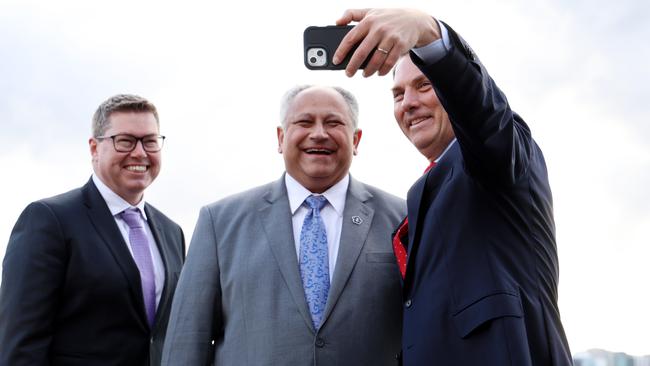Construction of Virginia class submarines is running two to three years late
Construction of the Virginia class subs Australia is supposed to buy in the early 2030s is running late by two to three years, along with all the US Navy’s major construction projects

The Virginia class submarines Australia is expecting to buy from the US in the early 2030s as part of the AUKUS security pact are running two to three years behind schedule, according to an internal US navy investigation.
The one page assessment, made public on late Tuesday (Wednesday AEDT), found the two classes of Virginia nuclear powered submarines currently under construction, known as IV and V, were running approximately 36 and 24 months, respectively, late “based upon current performance”.
The Secretary of the US navy, Carlos Del Toro, commissioned a ‘45 Day Review’ in January to “provide an assessment of national and local causes of shipbuilding challenges” in the wake of concern the US maritime industrial base was failing to satisfy US naval demands let alone those of Australia.
Speaking after the release deputy Secretary of State Kurt Campbell conceded the US faced naval supply chain challenges which were “a substantial focus at senior levels, the White House, Defence and the State department”.
“We have an unprecedented number of submarines in dry dock or requiring servicing; it is clear that supply chains were affected globally, but also specifically for [submarine] projects during Covid,” he told an audience at the Centre for New American Security in Washington on Wednesday (Thursday AEDT).
The navy’s assessment found every class of vessel under construction was running late, suggesting the navy “refine acquisition and contract strategies and re-imagine shipyard and skilled labour as a national asset”.
“We’ve run into challenges associated with the delivery of even the most basic equipment necessary to support both the circumstances in Ukraine but also just making sure that American defence stocks are kept up,” Campbell added.
Ambassador Kevin Rudd, speaking separately to Hugh Hewitt on American talk radio, said the government was confident the US would overcome supply bottlenecks to increase Virginia class submarine production to around two vessels a year — considered the minimum pact required — by 2028 or 2029.
“When I look at the numbers, and we’ve done a big careful study of this because we’re spending our money, there’s going to be a full set of apprenticeship schools now emerging in Newport News and Connecticut,” he said, referring to the sites on the US east coast where submarines are built.
Concerns about whether Australia would receive the first batch of promised nuclear-powered submarines in time to replace the ageing Collins class vessels intensified last month after the Biden administration ordered only one Virginia class submarine in its proposed 2025 budget, rather than the expected two.
Campbell, one of the most influential US bureaucrats behind the 2021 AUKUS pact, said the deal had “fused the United States and Australia much closer together than ever before in the past”.
“As is always the case more money helps, and what we’ve seen over the last year and a half is both by very generous support from Australia,” he said, referring to the approximately $4 billion Australia is set to pay the US to help it bolster its submarine production rate.
Mr Campbell, recently promoted to deputy secretary of state, played down fears that “a strain in American politics that is isolationist and nationalistic” within the Republican Party could derail AUKUS in the future. Republican presidential candidate Donald Trump, who is leading Joe Biden in most opinion polls ahead of the November election, has yet to opine on the AUKUS pact.
“This was an initiative started under the Morison government continued under the Albanese government. I believe it has strong bipartisan support in both countries,” he said, adding that he’d canvassed opinion widely in congress on both sides the political aisle.
“I think [my sentiments] are completely shared in the Democratic Party. And I think they are shared largely in the Republican Party”.
Campbell said other nations had sought to join the AUKUS pact and strongly hinted that Japan would become part of the second pillar of AUKUS, related to the joint development of advanced weapons.
“What you will see next week is both the culmination of a recent period of intense activity but also launching a period that really underscores that the US-Japan relationship is entering a fundamentally new phase that will both bring new capabilities to bear … [and] clear responsibilities,” he said, referring to the scheduled visit of Japanese Prime Minister Fumio Kishida to Washington.






To join the conversation, please log in. Don't have an account? Register
Join the conversation, you are commenting as Logout